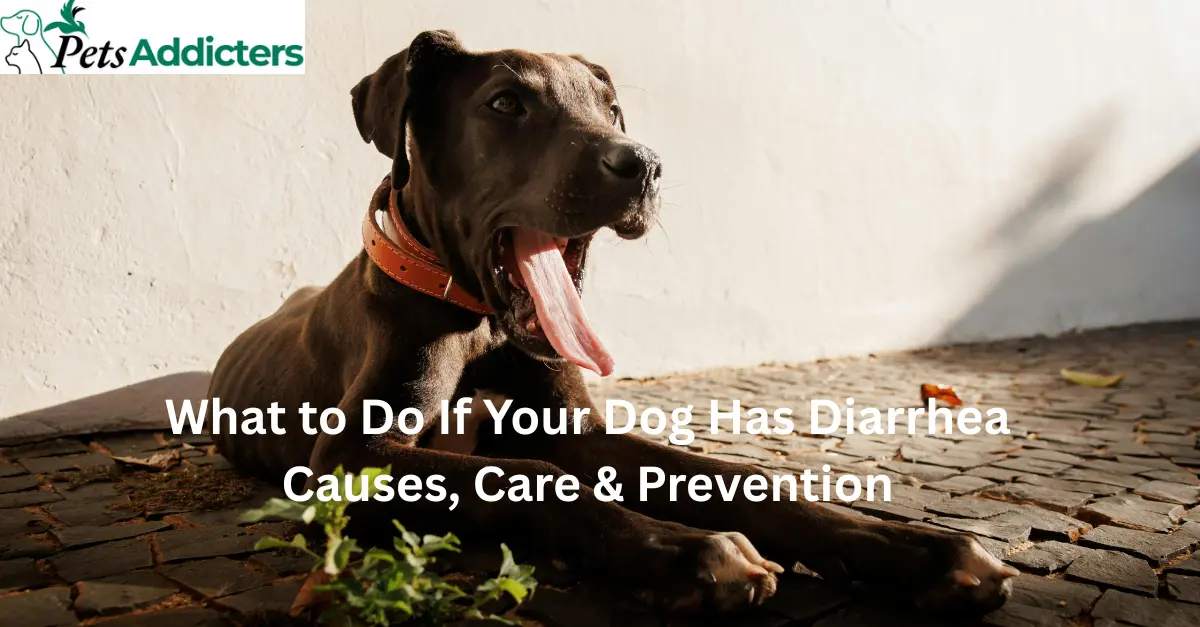Diarrhea in dogs is one of the most common health issues pet parents face. While it’s usually not a major concern, it can sometimes indicate an underlying problem that needs attention. Knowing what to do if your dog has diarrhea will help you keep your furry friend safe, comfortable, and healthy.
Common Causes of Dog Diarrhea
Several factors can trigger diarrhea in dogs:
- Dietary Changes: Switching food too quickly or giving table scraps.
- Food Intolerance or Allergies: Certain ingredients may upset your dog’s stomach.
- Parasites: Worms or intestinal parasites can lead to chronic diarrhea.
- Infections: Viral or bacterial infections may cause sudden digestive upset.
- Stress & Anxiety: Just like humans, dogs can have stress-related stomach issues.
- Medical Conditions: Pancreatitis, liver disease, or other illnesses may also be the cause.
What to Do If Your Dog Has Diarrhe
- Monitor Symptoms
Check the frequency, color, and texture of the stool. Note if there’s blood, mucus, or a foul smell. - Provide Fresh Water
Diarrhea can lead to dehydration quickly. Make sure your dog has access to clean, fresh water at all times. - Withhold Food for 12 Hours (If Mild)
Give your dog’s stomach time to rest. After fasting, reintroduce a bland diet such as boiled chicken and plain rice. - Switch to a Bland Diet
For the next 1–2 days, feed small portions of bland food like plain rice, boiled chicken, or pumpkin puree. - Avoid Treats & Table Scraps
Stick to simple, gentle meals until your dog recovers. - Consider Probiotics
Dog-safe probiotics can help restore healthy gut bacteria.
When to Call the Vet
Take your dog to the veterinarian immediately if you notice:
- Diarrhea lasting more than 48 hours
- Blood or worms in the stool
- Vomiting along with diarrhea
- Signs of weakness or dehydration
- Diarrhea in puppies or senior dogs (they dehydrate faster)
Preventing Future Episode
- Introduce new foods gradually.
- Keep trash and harmful foods out of reach.
- Stick to vet-recommended diets.
- Keep your dog’s vaccinations and deworming up-to-date.
- Manage stress with proper exercise and routine.
Final Thoughts
Dog diarrhea is common and often not serious, but it should never be ignored. Most cases improve with simple home care and dietary changes. However, persistent diarrhea can point to a deeper issue—so always consult your vet when in doubt.
Your furry friend relies on you, and a little quick action can save them from discomfort and health risks.
What should I do if my dog has diarrhea at night?
If your dog has diarrhea at night, provide fresh water and let them outside frequently. Avoid food until morning, then feed a bland diet. If it continues, consult a vet.
Can I treat my dog’s diarrhea at home?
Yes, mild diarrhea can often be treated at home with fasting for 12 hours, followed by bland food like boiled chicken and rice. Always monitor hydration levels.
When should I worry about dog diarrhea?
You should worry if diarrhea lasts more than 48 hours, contains blood, is accompanied by vomiting, or if your dog seems weak, dehydrated, or very young/old.
What foods stop diarrhea in dogs?
Boiled chicken, plain white rice, pumpkin puree, and dog-safe probiotics are common foods that can help settle your dog’s stomach.
Can stress cause diarrhea in dogs?
Yes, stress and anxiety are common triggers for dog diarrhea. Changes in routine, travel, or separation anxiety may upset their digestive system.

